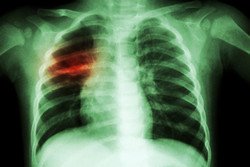Fast, accurate and cost-effective diagnoses to tackle respiratory infections
Recently published in the Annals of Internal Medicine, the study found that starting anti-HIV treatment within two weeks of TB being diagnosed improved survival rates among patients with both infections who had very low immune-cell counts. Those with strong immune systems, however, appeared to benefit from waiting until after the end of the six-month TB treatment before initiating anti-HIV therapy. The study recommended updating guidelines to take these findings into account. Treating HIV and TB simultaneously has proved challenging for a number of reasons, including the requirement for patients to take multiple pills, as well as drug to drug interactions and overlapping side effects. This particular study sought to investigate the optimal timing of HIV treatment initiation in light of recent clinical trials. This is one example of how the RID-RTI project, which began in July 2012, has contributed to improving the survival chances of patients with Respiratory Tract Infections (RTIs). These infections are caused by a variety of bacterial, viral and fungal pathogens and are major causes of morbidity and mortality in adults and children worldwide. RTIs such as TB and pneumonia are a truly global health problem. In 2013 there were an estimated 9 million new cases of TB, with between 1.3 and 1.5 million associated deaths. More people in the developing world contract TB because of poor immune systems largely due to high rates of HIV infection and the development of AIDS. According to the World Health Organisation (WHO), pneumonia is the leading cause of death in children globally, killing an estimated 1.4 million children under the age of five each year. One reason why RTIs continue to proliferate is that they are so difficult to diagnose quickly and accurately. Current tests are intensely time consuming, and as a result, patients presenting RTI symptoms are often treated uniformly with antibiotics without the causative microorganism being accurately identified. This can lead to the inappropriate use of antibiotics, which in turn increases patient morbidity and mortality. In order to address this issue, the RID-RTI project – built around a consortium of SMEs, universities and hospitals from Finland, France, Ireland and the UK – has sought to develop a rapid molecular diagnostic test capable of identifying a large range of microorganisms responsible for RTIs. This will lead to more appropriate therapies applied after the very first consultation. The test, which is being built on a simple ‘sample-in, answer-out’ diagnostic platform, will be cost-effective and user friendly, and will be capable of delivering results in under two hours. This sets it apart from current diagnostics technology. It is hoped that the speed and accuracy of the platform will revolutionise how RTIs are treated. Furthermore, an exploitation plan is now being developed to ensure that project results can be translated into commercial products. The ultimate objective is for new cost effective, user-friendly products to be routinely used in hospitals. The RID-RTI project is due for completion at the end of December 2015. For further information please visit: RID-RTI https://www.rid-rti.eu/rid-rti/home_page
Countries
United Kingdom



